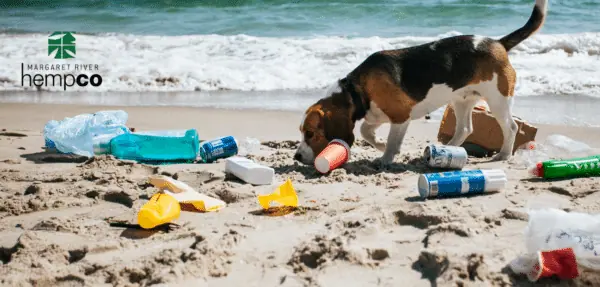
It’s the dawn of a new era in the field of sustainable production and consumption. While some are clinging to old destructive practices, others are leading the charge forward in eco-friendly innovation and developing products that are less harmful to the environment. Hemp plastic is one of the most promising.
It’s no surprise that Hemp, with a wide array of applications, is at the forefront of this revolution.
If we asked you to guess the most detrimental product to our environment, what would you say? We don’t even have to think twice before shouting “plastic!”.
What’s equally unsurprising is the demand for biodegradable, environmentally-friendly packaging alternatives. But is this a realistic hope?
Plastics and micro-plastics are polluting our bodies, waterways, oceans, and ground like never before. And it’s not just harming animals any more - it’s humans too.
Did you know that the average person consumes a credit card of microplastics every week? That’s around 20 grams of plastic going through our bodies by eating food and drinking water that our bad decisions have contaminated.
This week, we will look at Hemp Bioplastic’s benefits and why Hemp packaging is a better alternative to Normal plastics.
We’ll refer to regular plastic as a plastic made from non-renewable resources like coal, oil, gas, and minerals for this article.
Plastic is made from long-chain polymers, and are most often composed of compounds called ‘hydrocarbons’ - hydrogen and carbon chains.
Plastic is used everywhere from the bags at supermarkets to your cars’ panels; to the point that humans have quite an unhealthy addiction to using it!
This addiction has ended up being a detriment to the ecosystem in which we live.
There are two major categories of primary materials for plastics: Natural materials and synthetic/human-made materials.
Hydrocarbons derived from non-renewable resources and used to make plastics are classed as synthetic/human-made due to the chemistry involved in the process.
Fossil fuels get turned into hydrocarbons through various forms of heat treatment that isolate the desired compounds. Then materials called ‘propylene’ or ‘ethylene’ are used to produce multiple types of plastic.
We use seven main types of plastic all around the world. Each of the following classes is derived from non-renewable resources (coal, natural gas, oil, etc.)
Hemp bioplastics are made from leftover plant matter of the harvested cannabis plant. This leftover material is most commonly called ‘biomass’.
Hemp plastic can also be made with cold-pressed and refined Hemp Seed Oil, but this is the less-regularly used production method.
When being made from Hemp biomass, Hemp cellulose is the cornerstone of manufacturing. The cellulosic fibre can produce a range of viable plastic substitutes and has recently seen a sharp increase in commercial interests.
Technically yes, but it takes tens to hundreds of years to break down to a harmless point.
This means that once you dispose of a single-use plastic item, it’s going to stick around and cause damage to the planet longer than you are.
Your body will likely have broken down in the ground before the first piece of plastic you used in your life has.
How’s that for perspective?
While your single-use plastic is floating around in the ocean or being consumed by animals who don’t have the digestive systems to process it, millions of others are also oblivious to the damage being done.
The bottom line is that single-use plastics harm humans and animals alike - our whole ecosystem is suffering. We’re at the point where microplastics are being found in the placenta in early-stage fetuses.
We’ll just leave that there.
Technically yes, but how long it takes hasn’t been studied too much yet. People often assume that Hemp plastics will break down in shorter timeframes, but this is still based on anecdotal evidence.
However, even when we have more answers for this, it’s going to depend on whether or not we can stop bioplastics from making it into the environment.
Plastics don’t just break down in landfill - they have to be exposed to elements. Plastics must be broken down through heat treatment processes or risk polluting the environment for years to come.
The other thing to consider is that even if Hemp Plastics break down in the environment as quickly as some sources claim, we can’t just have water bottles leaking after six months in storage.
We’re going to need to make sure that they are sturdy for at least a year before breaking down! Otherwise, we’ll have more plastic waste than ever.
Whether you’re using traditional plastics or bioplastics, it’s best to practice the packaging’s responsible use and disposal even if it’s biodegradable.
Although Hemp Plastic is a much safer option for our ecosystem, using these alternatives won’t fix all of the problems we’re facing due to this unhealthy addiction to plastics.
Hemp bioplastic made from biomass or Hemp Seed Oil may very well be a part of the future of packaging, but we’ve still got to make sure that we are using it the right way!
Otherwise, we could just find a temporary fix to the real problem - our mentality on consumption.
Learn more about the basics of Hemp Bioplastics in our other blog What’s So Great About Hemp Plastic?